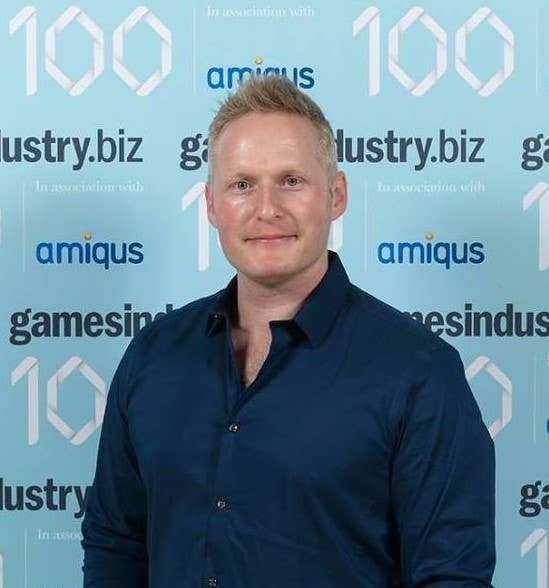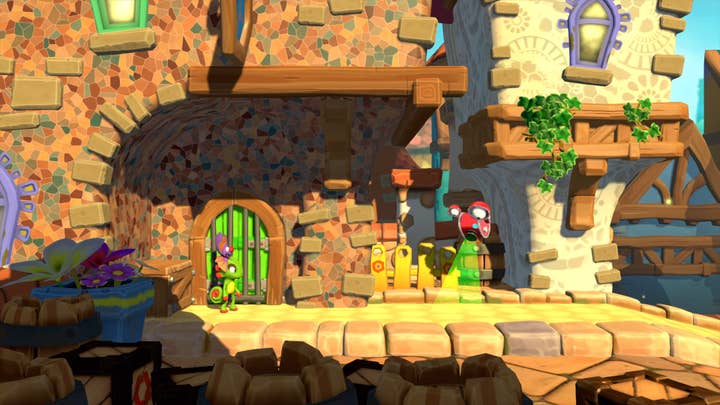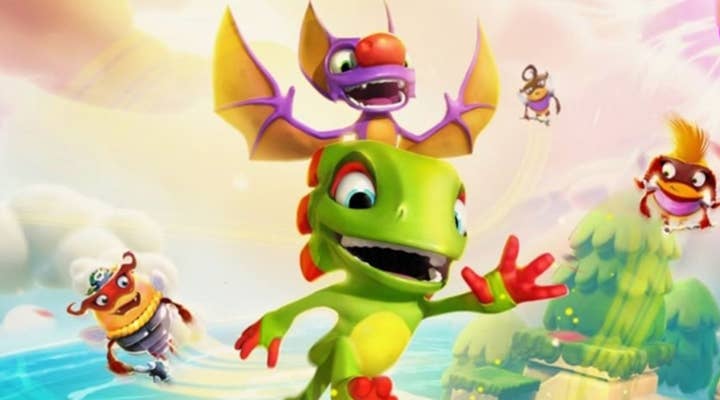Yooka-Laylee developer Playtonic plots new studios following major Tencent investment
The company says it expects to double its headcount in the next few years
Global games giant Tencent has bought a minority stake in UK developer and publisher Playtonic.
The sizeable investment will allow the studio to more than double its headcount, expand to three development teams and create more games, one of which will be a sequel to the 2017 3D platform game: Yooka-Laylee.
In an interview with GamesIndustry.biz, managing director Gavin Price said that the firm may open offices in new areas, move to a new HQ, and is even eyeing potential acquisitions in an effort to increase the company headcount from 40 to 90 over the next two years.

The deal follows the company's ambitious plans around the Yooka-Laylee IP.
"We've always had a dialogue with Tencent," says Price. "We got chatting to them about the future of 3D platforming and what we're doing next. I mentioned that Playtonic had this growth plan of being lots of people with lots of teams. They said don't do anything hasty, that they really liked these chats and wanted to discuss how Tencent could get involved.
"I was surprised, because I didn't expect them to be interested in Playtonic. It turned out that they had a department for genres, including a 3D platform department. So we had to formalise our future content plan a bit. And we wanted to have an aspiration goal as well, which was to make Yooka-Laylee an IP that could appear on a major fast food chain's kids meal box.
"They liked the studio and what we put out before, and they thought they could help us achieve those goals. And it just continued from there. Naturally, everyone wanted to do this, so we just threw it over to the solicitors and waited for them to tell me it was done."
He continues: "Tencent's been passionate about saying that it really is the money and their expertise whenever we want it. We explained what we wanted to do, and they said they don't want to derail any of that. And already, with the deal closing, we've been introduced to so many people. I remember reading on GamesIndustry.biz what Splash Damage said about being handed the cheat codes, and I am already getting a sense of that.
"Ultimately, this is about more games from us. We want to do more games more often"
"With Tencent having a stake in quite a lot of companies, there are lots of opportunities to be meeting and finding out more about each other. There's a huge level of support there.
"But ultimately, this is about more games from us. We want to do more games more often."
Tencent has its own marketing and PR resources, plus conferences and meet-ups with its various investments. But Playtonic says it's all optional.
"I guess I have a boss now for the first time in a while," Price says with a smile. "I'm joking. Already, in the emails I've sent over, I've been asking 'we're looking at this or that, is that ok?' And the replies I've got have been: 'Why are you asking us?'"
Price says the plan is to have three development teams working on different projects. But it's not all about expanding the company's resources. Part of the investment will enable Playtonic to leave behind its 'start-up mentality', expand its HR operations and play a more active role in the wider games industry.
"The crux of it is scaling up our game development teams. Getting more hires, and being able to operate multiple teams concurrently," he says.
"We are looking to build a workforce that is a lot more shareable across projects. As you're aware, a lot of us used to work at a company called Rare. And [back in the day] they had multiple teams, but those teams may as well have not known each other existed. Whereas we are trying to build up a company where people can be on different projects throughout their lifecycle, get on the credits, it is great for their development, but ultimately we're able to react and smooth out any bumps in the road. We don't want to crunch people to death.
"Also, now, we can spend time nurturing through talent, which is something we've not had the time as a business before.
"We've very much had this start-up mentality for the past six years. We probably should have broken out of it sooner than we have. Now, we are going to be doing things like proper HR solutions, legal teams, operational teams, wellness and events teams... we can do all this quality-of-life stuff. We're going to have a better base of operations. We will move location to somewhere that is better looking than our current office. And we may be opening in new locations.
"Also, if it makes sense, we may have one or two acquisitions, as well. It's hard to scale-up fast, so maybe we can find a solution that doesn't involve two to three years of hiring processes, and we can be in a location that is a lot more talent rich. And that's potentially not just UK."

In terms of new locations, Price has already identified Leamington Spa as a potential new office, and says it is looking at other locations where there are 'big educational institutions'.
The other area of the business the investment will support is the firm's new publishing division Playtonic Friends. As part of the announcement, Playtonic has recruited Danny Spiteri, formerly of Frontier, Merge Games Raw Fury and Team 17, as Head of Publishing. And Price says the Tencent investment allows the company to invest in bigger projects.
"[Playtonic Friends] is about finding quality. A really great team, a really great game, and someone where you can look at yourself in the mirror, and ask: 'are we adding value by helping these people, or are we being publishery and just doing it for a quick way of making money?' We still have the same core ethics running through our decision-making. But it opens up the type of partner we can work with. It's what we were doing, but enhanced."
Price says Playtonic's dev team was already working on three projects even before the Tencent money appeared. And although 3D platforming is part of that, the firm isn't entirely focused on the genre.
"If we had decided to remain doing one thing at a time, with just one team, I guess we would be announcing something around about now. But as it is, we've had that one team divided into three. I could show off three different projects right now. It's natural that when you have one team split into thirds, it's going to take three-times as long before we're ready to show anything.
"We should have done this two years ago. We could have afforded to be bolder with our plans than we realised"
"3D platforming is something we've always wanted to go back to. It's going to be one of the key genres we want to remain active in, across every generation. We're not going to do a Rare and do three 3D platformers at the same time: Donkey Kong 64, Banjo Tooie and Conker's Bad Fur Day. We're not going to have three teams making similar games."
It's not just more games, either. Price says that Playtonic's output will 'tick all the boxes' when it comes to indie, AA and AAA. And that a big focus for them is developing the tools and pipelines that will allow them to make better games faster.
Playtonic has always been a company that has dreamed big. From the moment it set-up with the initial Yooka-Laylee Kickstarter, the ambition was to create a studio that would be working on multiple projects and releasing games annually, akin to how Rare used to during the 1990s.
The company isn't there yet. Following the launch of 2017's 3D platformer Yooka-Laylee came 2019's 2D game Yooka-Laylee and the Impossible Lair. The Tencent money, Price says, will allow the business to achieve that vision. And he laments that the company may have been able to do this earlier.
"We did great with both of our games, but it has been that long-tail that surprised us," Price says. "I've never met anyone who has been able to say that they know what you're going to make to the nearest £10,000. And it's only in hindsight where we can say that this carried on a lot longer than we realised.
"We should have done this two years ago. Finding that period in a company's timeline, where it is comfortable from a cash-flow perspective where we can absorb all this downtime to work on this growth funding plan. It turns out we could have started it two years ago right on the back end of Impossible Lair. We could have afforded to be bolder with our plans than we realised. It's nice that we're not being risky as a company, but we were probably playing it a bit safe.
"But we're two years wiser and two years better. So let's kick this plan into gear. We're now even more prepared to do it."

